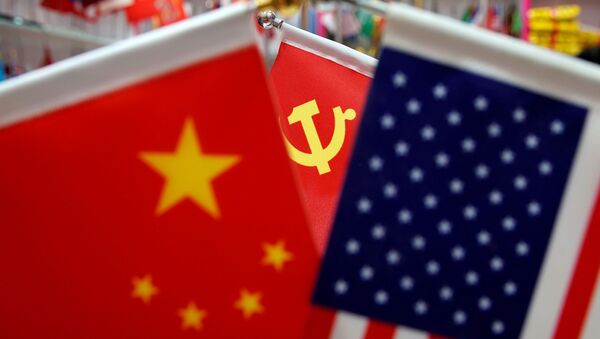KJ Noh, a scholar of Asia-Pacific geopolitics and correspondent for Flashpoints, Dissident Voice, CounterPunch and other outlets, told Radio Sputnik’s Loud and Clear Friday that while the US is attempting to ramp up hostilities with China, Beijing’s responses have been carefully measured, proving it’s not the threat Washington claims.
‘Respond Without Escalating’
“I think it’s a very measured, tit-for-tat response,” Noh told host John Kiriakou, especially in response to how extraordinary a move shutting down the Houston consulate was, which he said violated “if not the letter, at least the spirit” of the Vienna Convention.
“It shows that the Chinese are trying to respond in kind without escalating. Clearly, the US has moved up the escalation ladder, and the Chinese are trying to make sure that they respond in kind, send a strong message, without tipping their hand or without taking things even further up.”
Noh pointed out the Szechuan consulate was picked despite online polls in China showing very strong support for the US’ Hong Kong consulate becoming the target of Beijing’s response.
“But this is a much stronger message, they are going to bide their time before they do that. If they shut down Shanghai or Guangzhou consulates, that would hurt the US economically, but again they are holding that card in reserve. The early discussions which said they would shut down the Wuhan consulate, but that consulate is already more or less shut down, so that would be purely symbolic, and they chose not to do that.”
“The Shenyang consulate would intercept and break US intelligence and manipulation on Russia and North Korea, and they may do that at a later point. The Chengdu consulate really relates to Xinjiang and Tibet, and also we note that there’s been a tremendous escalation in the amount of propaganda and lies that are manipulated around Xinjiang. So this is probably why they did this.”
“From the US standpoint, this is an intelligence loss,” Noh said, noting Beijing refused to authorize the opening of another US consulate in Tibet. “In lieu of that, this was the key consulate that they were using” to carry out intelligence operations in Tibet and Xinjiang, he said.
“Let’s be clear here: embassies, consulates, they do do their share of intelligence gathering through a variety of means. The Chinese consulate in Houston was mostly involved in delivering visas; the US consulate in Chengdu was serving multiple functions and purposes.”
US Pivots to Cold War for Fear of China’s Alternative
“It goes back to this whole picture where we’re looking at a chessboard, where there are these tactical maneuvers happening … inside the larger game of US-China cold war confrontation,” Noh told Sputnik.
“The US has branded China a ‘revisionist power,’ which is code for ‘official enemy’; the Chinese have done no such thing, but right now, the US is behaving and acting as if China were an enemy, and the question we have to ask is: did we, the United States people, agree to this, and if not, what can we do about it?”
Noh pointed to the genesis of this strategy in the Obama administration’s “pivot to Asia” in 2011, but noted it received a much more clear articulation in the Trump administration’s National Security Strategy and National Defense Strategy in 2017 and 2018. However, Noh said that US Secretary of State Mike Pompeo’s speech at the Richard Nixon Presidential Library in Yorba Linda, California, on Thursday was “the most direct and explicit enunciation of this change in policy.”
“Let’s be clear here: the kind of imperial presumption in that somehow China was obligated to change simply by virtue of trading with the United States is an extraordinary presumption; there’s an extraordinary arrogance there. And the simple fact is the United States engaged with China to counterbalance against the USSR. The other language and the other assumptions are really made up post-factotum.”
“And we can also point out that US engagement with China was to use it as a kind of supply chain workshop. The belief was that China would stay in its corner, in its kind of subjugated position vis-a-vis the United States and US capital. The reason why China is now being widely and thoroughly denounced is because it did not stay in its subordinate position, and instead used the relationship to develop its country in a way that was non exploitative and non-capitalist, and which did not fit the demands or the expectations of US empire.”
“China does not pose a threat, and anything that alleges that is really misunderstanding the nature of the situation,” Noh urged. “It does not pose a threat to the US or the people of the US, it poses a threat to the international capitalist ruling class because it poses an example of a model of development which is people-centered and which is a hybrid or non-capitalist and non-Western, and that is the threat it poses.”
“China was expected to fall apart or to be overthrown - that didn’t happen. China has not been a threat to its neighbors,” Noh said. “What the Chinese have done is they’ve created a society where people have freedom from hunger and freedom from fear, and that’s an extraordinary accomplishment by any measure in human history. And that is why the empire wants to challenge and threaten and take down China.”




